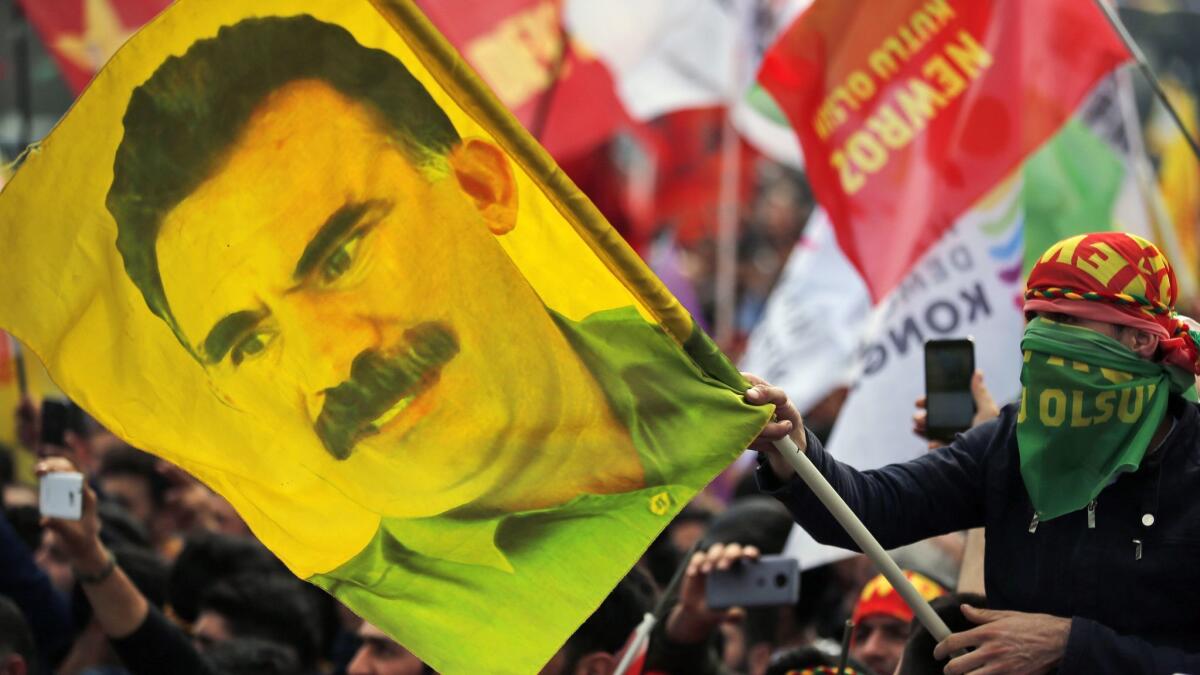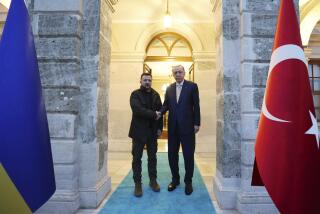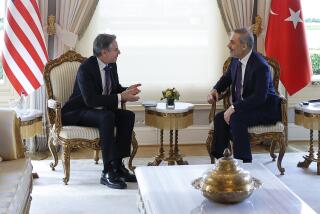Turkey may enlist its No. 1 enemy to broker a peace with Kurdish separatists

The Turkish government’s enemy No. 1 has spent the last two decades in physical isolation on a prison island off the coast of Istanbul. But Abdullah Ocalan’s influence extends to Kurds across the Middle East.
Statements by the 71-year-old — carried out of Imrali island by sporadic visitors — have been published in best-selling books, and inspired both war and peace. Now, there are signs Ankara may be turning to him to broker a new peace with Kurdish separatists, not just in Turkey, but also in neighboring Syria.
On Wednesday, Turkish officials said they had lifted restrictions on visits to Ocalan. The announcement followed a visit to Ocalan by his lawyers, the first such meeting Turkish authorities have allowed in eight years, and came amid the largest mass hunger strike in Turkey’s history. More than 3,000 people have participated for months, and eight have committed suicide after calling for Ankara to allow Ocalan regular visits.
For the recent visit, Ocalan’s lawyers underwent three separate body searches before taking a 2 ½-hour boat ride to Imrali to meet Ocalan, who was dressed in a dark blue jacket, velvet pants and linen shirt. The meeting, said Rezan Sarica, one of two lawyers who attended the May 2 session, was akin to what detainees at Guantanamo Bay have gone through — their lawyers sent to an isolate island lockup and not allowed to bring any paper or documents with them, or record what was discussed.
“He did not waste time, he had already thought about what to say and had a statement to give us,” Sarica said. The statement, signed by Ocalan and the three other Kurdish militant leaders held on the island, called on hunger strikers not to risk their lives. They also stood by a 2013 statement calling for a transition to political struggle, an announcement that led to a two-year cease-fire at the time. “The problems in Turkey and even the region, primarily the war, cannot be solved through physical violence, but with reason, and cultural and political force,” the statement read.
Ocalan also extended the call to the Syrian Democratic Forces, the U.S.-backed Kurdish militia in northern Syria that sees him as the group’s ideological leader. Ankara has threatened war against the forces, even if it meant fighting U.S. troops, and Ocalan instead advised the group to refrain from a “culture of conflict” and keep “Turkey’s sensibilities in mind.”
That advice comes amid statements from SDF leaders that they are engaged in a dialogue with Ankara brokered by Washington. SDF leaders have said they have met over the last few weeks with Turkish intelligence officials, who in turn have been meeting with Ocalan.
Such steps are not surprising given Ocalan’s influence in northern Syria, said Galip Dalay, a visiting scholar at Oxford University.
“Ocalan is still the unrivaled, undisputed leader of the Kurdish movement. There is no other figure that can come close to his stature,” Dalay said. “That doesn’t mean whatever decision he makes, the organizations follow it without question, but those organizations cannot take a public stance against his decision.”
The fact that Ankara was now allowing such statements to be released by Ocalan though, appears to be a sign that Turkey is open to fresh dialogue. “No decision has been made yet,” said Dalay, “but [Turkey and Ocalan] are saying, ‘Let’s test the waters, see what is out there, and if this proves to be positive, we can build on it.’”
Ocalan has been behind bars since 1999, when Turkish intelligence agents took him into custody in Kenya and brought him to Imrali. There, he was tried and sentenced to death on charges of treason and sedition for his role as the leader of the Kurdistan Workers Party, or PKK, which has waged a four-decade insurgency in which more than 40,000 people have died. Turkey and its allies, including the U.S., consider the PKK a terrorist group.
In 2002, Turkey commuted Ocalan’s sentence to life in prison with no possibility of parole. But Turkey has imposed a no-fly zone over Imrali since then, and no vessels have been allowed to approach within five miles. Ocalan was the sole prisoner on Imrali until 2009, when Ankara began rotating a handful of other top PKK prisoners through, partly in hopes they could persuade the Kurdish leader to call for a cease-fire to the insurgency.
Legally, Ocalan has a right to see his lawyers once a week, but his counsels’ requests — more than 800 of them — have been denied in often bizarre ways, said Sarica. Bad weather or mechanical problems with the boat that would bring them to the island were cited by authorities between 2011 to 2016, he said. Then a state of emergency was imposed after a failed coup attempt.
This year, Sarica was told there was a new disciplinary board on the island, and Ocalan was being punished for unspecified violations of prison rules.
So the May 2 meeting, Sarica said, came out of the blue.
“From a legal perspective, nothing had changed, so it must have been a political decision,” he said.
For many who support Ocalan, the ball is now in Ankara’s court.
“When you isolate [Ocalan], you are isolating the problem itself, the political aspect of the problem, and the person that you should be speaking to regarding this problem,” said Tayip Temel, a lawmaker from the People’s Democratic Party, or HDP, a pro-Kurdish opposition party whose leaders helped broker the 2013 cease-fire between the PKK and Ankara.
That agreement, announced at Nowruz celebrations in the city of Diyarbakir to a crowd of hundreds of thousands, was borne out of months of shuttle diplomacy by HDP leaders, and secret meetings between Turkish intelligence officials and PKK leaders in Europe.
The cease-fire, however, collapsed in 2015, in part because of ongoing warfare in neighboring Syria, where a new Kurdish militant group, also inspired by Ocalan, began seizing territory from Islamic State militants. Turkey, which says the Kurdish groups in Syria are mere extensions of the PKK, was alarmed by their support from the U.S.and their sudden rise to power across its border.
Inspired by the events across the border, Kurdish militants in Turkey renewed an armed struggle. In Diyarbakir, young Kurds barricaded themselves in the heart of the city, sparking a battle with the Turkish military that lasted for months. At least 400 people were killed, and much of the historic city center was left in ruins. Similar battles took place across Turkey’s Kurdish-majority southeast, and Kurdish militants carried out bombings in cities as far west as Istanbul.
At least 4,356 people have died in the conflict since 2015, according to a tally by the International Crisis Group. The renewed conflict also has had political repercussions for Turkey. At least 7,000 members of the HDP, the third-largest political party in the country, have been sent to prison, including its top leadership and dozens of lawmakers. The group’s calls for a political dialogue with the PKK have been branded by authorities as support for terrorism.
Ankara’s conflict with the PKK has spilled over into Syria and Iraq. Turkey invaded and took control of parts of northwestern Syria in 2016 and has threatened to push east all the way to the Iraqi border, even if it means fighting U.S. troops deployed alongside the SDF there. In northern Iraq, where the PKK is based, Turkey has also stationed hundreds of troops and has carried out repeated airstrikes.
Ocalan spends 23 hours a day in solitary confinement, but has a television in his cell and can watch a handful of Turkish news channels and read selected newspapers.
As a result, he most surely knows that Temel and two other HDP lawmakers have been on a hunger strike since March 8. Holed up in the Diyarbakir HDP office, they are abstaining from food, subsisting on tea, sugar and salt water, and a handful of essential vitamins. Temel, who has lost nearly 25 pounds, says Ankara must allow regular visits for Ocalan and would be responsible for the deaths of any of the strikers.
In a nearby home in the winding narrow streets of Diyarbakir, Naime Celik’s mother brings her daughter a glass of water and listens in silence as she explains why she has been on a hunger strike since March 1. Celik, 21, who says she has lost more than 40 pounds during the protest, was detained in 2016 by police and charged with being a PKK member, but her trial has yet to begin. In April a judge ordered that she be released pending trial.
“Ocalan initiated the 2013 peace process, which I think were the best days in this country,” Celik said, “but some powers now want to destroy that process and put him in isolation again.”
Celik’s family, like many others in Diyarbakir, was displaced in the 1990s, when the Turkish military used a scorched earth campaign to uproot support for the PKK in the southeast, razing about 4,000 villages. She grew up hearing about that conflict, and when Diyarbakir saw urban fighting between Kurdish militants and Turkish soldiers in 2015, she says, her instincts pushed her to join the fighters — but she didn’t because she had read Ocalan’s writings.
“Ocalan is not the killer he is made out to be in the media in Turkey,” she said. “He needs to have a direct conversation with the public, but unfortunately for the last eight years he has been in isolation in prison. Kurdish youth watch his statements closely. If Ocalan said to the youth in Turkey today to destroy the country, to rise up, they would do it for him. But instead Ocalan says to go and educate ourselves, to learn to express ourselves better, and peace will come without conflict.”
Not everyone in Turkey is convinced allowing Ocalan to speak would prove a wise idea.
Hilal Kaplan, a columnist with the Daily Sabah newspaper, said Ocalan has lost influence with Kurdish militants over the years, evidenced by the fact that the PKK broke the 2013 cease-fire ordered by him. “I don’t think the state, at least people in the government, think that Ocalan has power over the people who are running the PKK at the moment,” said Kaplan.
Ibrahim Karatas, a columnist with Yeni Akit newspaper, questions whether Ocalan really wants peace at all. Giving him a platform to speak publicly, Karatas said, would just be a chance for Ocalan to reassert his influence. “No one in Turkey is ready right now for a peace process. They are hoping the government learned its lessons from the last time they tried peace, and if they renew a peace process again, nothing good is going to come from it.”
Farooq is a special correspondent.
Turkey puts down roots in a corner of war-torn Syria »
More to Read
Start your day right
Sign up for Essential California for news, features and recommendations from the L.A. Times and beyond in your inbox six days a week.
You may occasionally receive promotional content from the Los Angeles Times.





